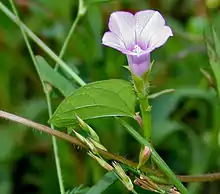Ipomoea triloba
Ipomoea triloba is a species of Ipomoea morning glory known by several common names, including littlebell and Aiea morning glory. It is native to the tropical Americas, but it is widespread in warm areas of the world, where it is an introduced species and often a noxious weed. This is a fast-growing, vining, annual herb producing long, thin stems with ivy-like, petioled, heart-shaped leaves 2.5–6 centimetres (0.98–2.36 in) long.[1] The leaves sometimes, but not always, have three lobes. The vines produce tubular bell-shaped flowers, each about two centimeters long. They are quite variable in color, in shades of pink, red or lavender, with or without white markings.
| Ipomoea triloba | |
|---|---|
 | |
| Scientific classification | |
| Kingdom: | Plantae |
| Clade: | Tracheophytes |
| Clade: | Angiosperms |
| Clade: | Eudicots |
| Clade: | Asterids |
| Order: | Solanales |
| Family: | Convolvulaceae |
| Genus: | Ipomoea |
| Species: | I. triloba |
| Binomial name | |
| Ipomoea triloba | |
| Synonyms | |
| |
References
External links
 Media related to Ipomoea triloba at Wikimedia Commons
Media related to Ipomoea triloba at Wikimedia Commons Data related to Ipomoea triloba at Wikispecies
Data related to Ipomoea triloba at Wikispecies- Jepson Manual Treatment
- PIER Species Profile
This article is issued from Wikipedia. The text is licensed under Creative Commons - Attribution - Sharealike. Additional terms may apply for the media files.